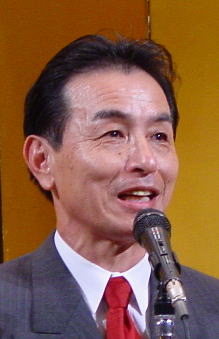 It has been my pleasure to serve as president of the Japan-America Air
Force Goodwill Association (JAAGA) since April 2003, but the time has now
come to pass the baton to another, and on this occasion I would like to
express my heartfelt appreciation for the warm support and kind cooperation
I have received from everyone.
It has been my pleasure to serve as president of the Japan-America Air
Force Goodwill Association (JAAGA) since April 2003, but the time has now
come to pass the baton to another, and on this occasion I would like to
express my heartfelt appreciation for the warm support and kind cooperation
I have received from everyone.The Japan-US alliance is an essential part of assuring not only Japan’s own peace and security but the development of East Asia as a whole. JAAGA is proud to play an important role in enhancing our mutual security through the promotion of trust and cooperation between the Japan Air Self-Defense Forces and the US Air Force, and it is my fervent hope that JAAGA members will continue to provide our new president with the same support and cooperation from which I benefited as we continue our efforts to achieve this mutual goal. I, of course, will continue to the best of my limited abilities to provide whatever assistance I can. As I step down from my post, however, I would like to take this one last opportunity to emphasize how important it is in today's world for Japan to continue to strengthen its relationship with the United States.
The United States Department of Defense last year in its annual report to the American Congress published an analysis of China’s military power, which stated that the full extent of defense spending in China was likely to be two to three times as large as officially published figures. The report further suggested that China could be spending up to $90.0 billion to strengthen its armed forces. The threat China poses through its military strength can be seen in any number of Chinese policies. The resolution of the Taiwan issue is seen by China as essential to breaking what it considers to be a blockade by international forces against its maritime security and emergence through and beyond the oceans. Although China claims to be promoting solidarity throughout the Far East, it also seeks to drive a wedge between Japan and the US, thereby weakening American influence in Asia. The passing of a Chinese “anti-secession law” is intended to intimidate and create dissent among Taiwan’s political leaders as well as provide a legal basis for bringing political, diplomatic, and military pressure on the US to withdraw its support from the Taiwanese.
During the Cold War, when the entire world stood in conflict politically, economically, and militarily, it was enough for Japan to follow suit with those around her. Facing the current threat, however, requires that Japan be prepared to play a significant role. The US has thus far been a crucial presence in ensuring the effective maintenance [of peace and security] not just in the Far East but throughout the entire Asia-Pacific region. At this point in time, however, what country is there to play the role of ensuring that the US remains involved in Asia-Pacific affairs if not Japan? Unfortunately, Japan’s desire to deepen economic relations with China seems to have clouded its understanding of the importance of showing firm resolve in the face of any threat posed by the Chinese. I cannot overemphasize the importance of recognizing that the Chinese perceive Japan’s ambivalence and are now intent on seeding dissent here in order to weaken the Japan–US alliance. It seems to me that the time has come to make a choice between “firm resolve” and “détente,” and that we should remind ourselves that economic détente is not possible without firm resolve for the simple reason that firm resolve is what makes the Japan-US alliance a credible deterrent. Although the pending realignment of US military forces might be at cross-purposes with mutual cooperation, it is time for us to give serious consideration to the burden we ourselves must bear in establishing national security for Japan’s future. I believe that strengthening the Japan-US alliance together with establishment of a credible deterrent in the form of a fully independent defensive force is the single greatest priority Japan faces today.
(Kouji Muraki, 4th president of Japan America Air Force Goodwill Association)